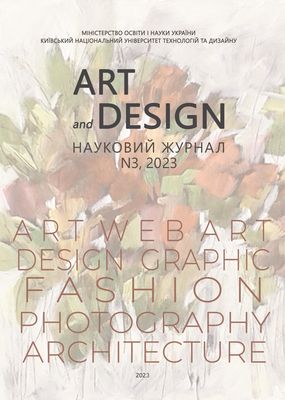UPCYCLING AND MINIMALISM AS FASHION TRENDS OF SUSTAINABLE CONSUMPTION OF FASHION PRODUCTS
DOI:
https://doi.org/10.30857/2617-0272.2023.3.9Keywords:
fashion product, clothing design, fast fashion, slow fashion, sustainable fashion, mass market, upcycle design, project practices, minimalism style, fashion clothing, fashion trend, recycling, fashion industry, design activityAbstract
The purpose of the research is to determine the main project practices of the formation and implementation of the concept of sustainable consumption of fashion industry products and ecologically oriented methods of creating fashion products in the mass market segment. The research methodology is based on the implementation of a comprehensive approach to determining the criteria for spreading the concept of sustainable consumption in modern fashion. To characterize the main principles of fast, slow and sustainable fashion, a comparative analysis of the factors of the functioning of certain concepts in the modern fashion clothing market was carried out. In working with sources of primary information (design solutions of clothing models of leading fashion clothing brands, application of means of compositional design solutions and decoration of fashion products, characteristics of functional properties of fashion products of various assortments and purposes), subject-analytical, compositional and stylistic research methods are applied. In the context of conducting a structured analysis of project practices of sustainable consumption, a comparative method of literary and visual information analysis is applied, based on documentary sources, fashion photography and illustration (materials from official websites, catalogs, fashion shows of designer brands on the topic of the study). The work characterizes the distinctive features of the concept of fast and slow fashion, sustainable consumption of fashion products. A comparative analysis of the formation of these concepts in the system of consumption of fashion products is presented. The main provisions and directions of design activities for the realization of the concept of slow fashion have been formulated. The principles of sustainable fashion are defined, which encourage the formation of a culture of creating and consuming fashion products, in particular, fashionable clothes. Systematization of approaches to the implementation of the principles of sustainable fashion in design activities in the fashion industry has been carried out. The style of minimalism is characterized as the basis for creating fashion products that meet the principles of the concept of sustainable consumption and long-term exploitation of fashionable clothes in the mass market segment. The basic criteria for the impact of a minimalist approach to creating fashion products on the production and consumption of fashionable clothes are formulated. Aspects of sustainable development of design activities based on the implementation of a minimalist approach to creating fashionable clothes are defined. The phenomenon of upcycling and its importance for the creation of unique fashion products are characterized. The basic criteria for the creating of fashion products by means of upcycling have been formed. Upcycling is characterized as a method of designing and carrying out design activities. The scientific novelty of the results is determined by the justification of the means of minimalism and upcycling not only as methods of creating relevant fashion products, but as project approaches to the spread of the concept of sustainable consumption and sustainable fashion in modern design activities. In the work, a comparative analysis of the main principles of the functioning of fast, slow and sustainable fashion as a concept of moderate consumption of fashion products in the mass market segment of the modern fashion industry is carried out. It is well-founded that a minimalist approach to the development and consumption of fashionable clothing improves the culture of sustainable development of the fashionable clothing market. The practical significance of the work consists in determining the main means of upcycle design as a method of creating unique fashion products and developing clothing models for various purposes with increased functional properties or elements of transformation. It is substantiated that ecologically oriented methods of creating clothing models contribute to the development of current project images and encourage consumers to introduce moderate consumption of fashion products in the mass market segment. It was determined that the most appropriate for designing clothing models in this segment of the market can be considered the combination of various options of proportional and constructive solutions.

